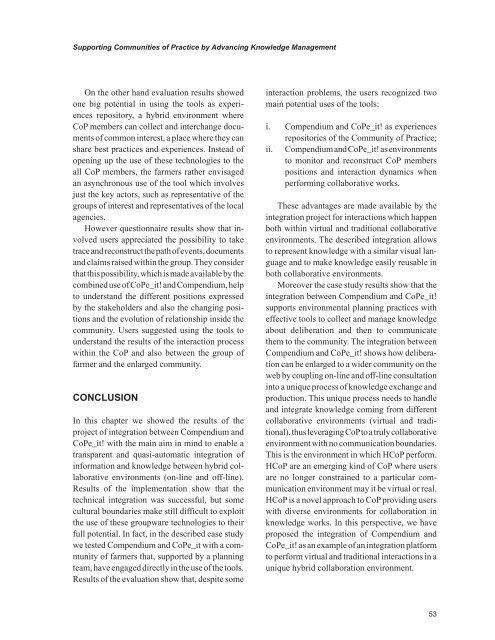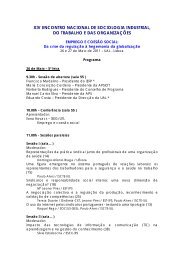Web-based Learning Solutions for Communities of Practice
Web-based Learning Solutions for Communities of Practice
Web-based Learning Solutions for Communities of Practice
You also want an ePaper? Increase the reach of your titles
YUMPU automatically turns print PDFs into web optimized ePapers that Google loves.
Supporting <strong>Communities</strong> <strong>of</strong> <strong>Practice</strong> by Advancing Knowledge Management<br />
On the other hand evaluation results showed<br />
one big potential in using the tools as experiences<br />
repository, a hybrid environment where<br />
CoP members can collect and interchange documents<br />
<strong>of</strong> common interest, a place where they can<br />
share best practices and experiences. Instead <strong>of</strong><br />
opening up the use <strong>of</strong> these technologies to the<br />
all CoP members, the farmers rather envisaged<br />
an asynchronous use <strong>of</strong> the tool which involves<br />
just the key actors, such as representative <strong>of</strong> the<br />
groups <strong>of</strong> interest and representatives <strong>of</strong> the local<br />
agencies.<br />
However questionnaire results show that involved<br />
users appreciated the possibility to take<br />
trace and reconstruct the path <strong>of</strong> events, documents<br />
and claims raised within the group. They consider<br />
that this possibility, which is made available by the<br />
combined use <strong>of</strong> CoPe_it! and Compendium, help<br />
to understand the different positions expressed<br />
by the stakeholders and also the changing positions<br />
and the evolution <strong>of</strong> relationship inside the<br />
community. Users suggested using the tools to<br />
understand the results <strong>of</strong> the interaction process<br />
within the CoP and also between the group <strong>of</strong><br />
farmer and the enlarged community.<br />
CONCLUSION<br />
In this chapter we showed the results <strong>of</strong> the<br />
project <strong>of</strong> integration between Compendium and<br />
CoPe_it! with the main aim in mind to enable a<br />
transparent and quasi-automatic integration <strong>of</strong><br />
in<strong>for</strong>mation and knowledge between hybrid collaborative<br />
environments (on-line and <strong>of</strong>f-line).<br />
Results <strong>of</strong> the implementation show that the<br />
technical integration was successful, but some<br />
cultural boundaries make still difficult to exploit<br />
the use <strong>of</strong> these groupware technologies to their<br />
full potential. In fact, in the described case study<br />
we tested Compendium and CoPe_it with a community<br />
<strong>of</strong> farmers that, supported by a planning<br />
team, have engaged directly in the use <strong>of</strong> the tools.<br />
Results <strong>of</strong> the evaluation show that, despite some<br />
interaction problems, the users recognized two<br />
main potential uses <strong>of</strong> the tools:<br />
i. Compendium and CoPe_it! as experiences<br />
repositories <strong>of</strong> the Community <strong>of</strong> <strong>Practice</strong>;<br />
ii. Compendium and CoPe_it! as environments<br />
to monitor and reconstruct CoP members<br />
positions and interaction dynamics when<br />
per<strong>for</strong>ming collaborative works.<br />
These advantages are made available by the<br />
integration project <strong>for</strong> interactions which happen<br />
both within virtual and traditional collaborative<br />
environments. The described integration allows<br />
to represent knowledge with a similar visual language<br />
and to make knowledge easily reusable in<br />
both collaborative environments.<br />
Moreover the case study results show that the<br />
integration between Compendium and CoPe_it!<br />
supports environmental planning practices with<br />
effective tools to collect and manage knowledge<br />
about deliberation and then to communicate<br />
them to the community. The integration between<br />
Compendium and CoPe_it! shows how deliberation<br />
can be enlarged to a wider community on the<br />
web by coupling on-line and <strong>of</strong>f-line consultation<br />
into a unique process <strong>of</strong> knowledge exchange and<br />
production. This unique process needs to handle<br />
and integrate knowledge coming from different<br />
collaborative environments (virtual and traditional),<br />
thus leveraging CoP to a truly collaborative<br />
environment with no communication boundaries.<br />
This is the environment in which HCoP per<strong>for</strong>m.<br />
HCoP are an emerging kind <strong>of</strong> CoP where users<br />
are no longer constrained to a particular communication<br />
environment may it be virtual or real.<br />
HCoP is a novel approach to CoP providing users<br />
with diverse environments <strong>for</strong> collaboration in<br />
knowledge works. In this perspective, we have<br />
proposed the integration <strong>of</strong> Compendium and<br />
CoPe_it! as an example <strong>of</strong> an integration plat<strong>for</strong>m<br />
to per<strong>for</strong>m virtual and traditional interactions in a<br />
unique hybrid collaboration environment.<br />
53



